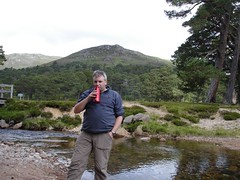Answering a question across on the Legalise Wild Camping site - what do wild campers bring to local communities:
I went to the trailhead (outside Braemar). I have paid my National Trust for Scotland membership, so parking is free. I hike a short distance on Friday night and I wild camp. Hike some more and return to car. In to Braemar. Gear shop and lunch, then back to city.
All in all, my single trip has netted around a tenner from me for a couple of shops in Braemar. Half again on a wee torch in Aberdeen before the trip, plus hiking food in Asda.
I can not afford to pay for brick accommodation, and prefer being out in the wilds. For not using any of their facilities, Braemar has earned a tenner from me.
The only cost to Braemar was those involved in the provision of the services that I paid money for. If I wasn't there, the businesses would still have paid for the staff, heating, etc. I'm passing trade. I'm made to feel welcome, and enticed in by the provision of goods and services (eg another dry-bag and a venison burger & chips).
On the Southern Upland Way, I wild camped, or bothy camped. Twice I paid for brick shelters, and in one of these cases I could have wild camped, but I felt like a change. Again, I was passing trade. I see little difference between vehicular passing trade and this chap trudging across country. Where a car requires roads, and the like, I'll be happy with access, leaving no trace and just the space to pitch a tent out of the way of anyone.
Arriving in a community, I may spend money on goods (postcards home, foods to take, or eat out of way, batteries, replacement kit, etc), or services (cooked foods, refreshments, Internet connection), and I may wish to upgrade to a brick shelter. Just because I am on foot does not make me less of a human being.
Wild camping opens new communities to long-reaching trips. Those on a trailhead are better served to make money from multi-day trekkers, but those in the hinterland may find that they are now getting more people visiting, and taxis being called to run people back to their transport, or busses being used more often.
Wild campers, true wild campers, leave less trace than many. Wild campers are as much part of the tourist industry as any day trippers. Naturally, walking for 2 days from a trailhead rather than just 1 day is better for people's health and maybe even their mental wellbeing.
Wild camping doesn't suit everyone, and not all camping is wild camping. There is still a need for brick shelters and official campsites. The Kings House by Glencoe is a case in point. Their 'wild camping' facilities bring in people as well as those paying for a roof, but people pay for meals and refreshments. It is a business and with business acumen.
Scenario - Jack is determined to wild camp no matter what the weather. He drives to xxxx, arriving late, he hikes past the closed village facilities into the night, wild camps and enjoys a Saturday on the hills, camping again that night, and hikes back to the car park. Settling the bill for parking, he buys some snacks at the local shop and drives off home contented. Jack tells his friends on the forum about this place, and three of them arrange to head off the following weekend to see what the fuss is. They arrive earlier, buy a pub meal and make to head into the hills. One wants to stay in the pub, so the other two head off to the hills, meeting their pal the next day.
Life isn't black and white. I wild camp. I spend money on kit. Tent, sleeping kit, cookset, etc - I spend more than if I was just day-trekking. Wild camping allows me the opportunity to spend my money in different ways. I'm still a tourist and potential customer - if a shop wishes to treat me as a second class citizen then I simply walk out and take my money elsewhere. I also have the opportunity to mention this treatment to other people. Poor service is poor service, whether wild camping or brick camping.
--
Wild camping ePetition reached 663 signatures. One-two-Beast!
 Getting on with my life and thinking about things.
Getting on with my life and thinking about things.























